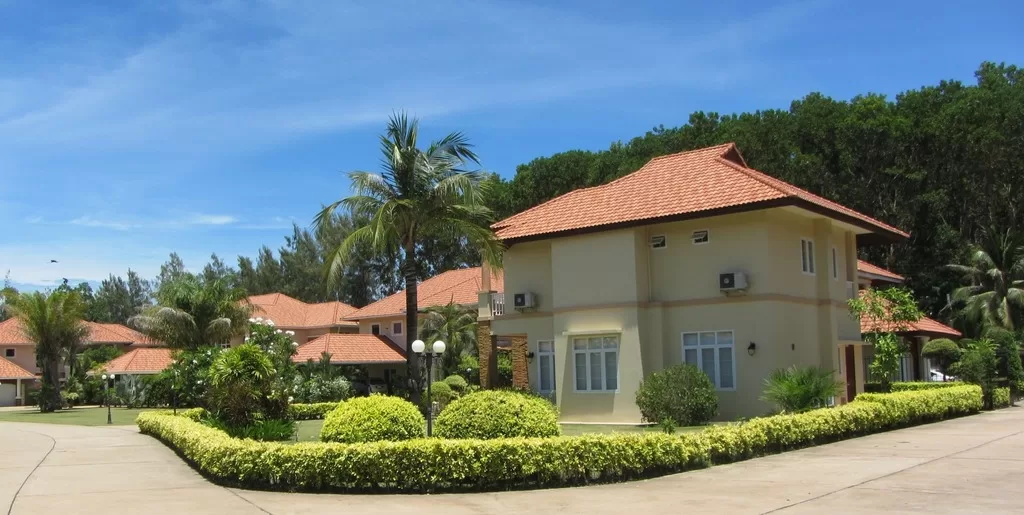Real estate transactions in Thailand for non-resident buyers and sellers have specific regulations and taxes that apply to them.
It is important to understand these regulations and taxes before engaging in any real estate transactions in the country. Be aware of the house prices in Thailand to correctly calculate the amount you might need for a loan.

Thai Legislation – Land Ownership or Lease
One of the main regulations that non-resident buyers should be aware of is the restriction on foreign ownership of land in Thailand. Foreigners are not allowed to own land in the country, but they can own a building on the land through a leasehold agreement.
This means that non-resident buyers will be purchasing the right to use and occupy the property for a specific period of time, usually 30 years, with the option to renew for an additional 30 years.
However, it’s important to note that this regulation is subject to change, and it’s best to verify the current regulations before buying any property.
Another option for foreign buyers is to purchase a condominium unit, as foreign ownership of condominiums is allowed up to 49% of the total units in a building. However, it’s important to note that this rule is also subject to change, and it’s best to verify the current regulations before buying any property.
Read Also:
Mortgage for Non-Residents in Thailand
Non-resident buyers should also be aware of the process of obtaining a mortgage as a non-resident, which can have a longer process than for resident buyers. Non-residents are required to have a valid work permit or long-term visa, and they may also need to provide additional documentation such as a copy of their passport and proof of income.
Moreover, the interest rate for mortgages for non-residents is usually higher than for residents. To find up-to-date prices on housing units in the country you can use Thailand-Real.Estate as a reference.
Here is a checklist of documents that non-residents in Thailand will typically need to have in order to obtain a mortgage loan:
- Copy of passport;
- work permit or long-term visa;
- proof of income;
- proof of employment;
- financial statements;
- property appraisal;
- sales and Purchase Agreement (SPA);
- property Tax Receipt;
- title Deed: Non-residents will need to provide a copy of the title deed of the property they wish to purchase;
- Land Office Tax Payment Receipt.
By having all these documents ready, non-residents in Thailand can ensure that they are well-prepared when applying for a mortgage loan and can help to make the process as smooth as possible.
Taxes for Real Estate in Thailand
When it comes to taxes, non-resident buyers are subject to a withholding tax of 1% on the sales price of the property that must be paid at the time of transfer. Additionally, there is a specific business tax of 3.3% on the sales price for properties that are not used as primary residences.
For non-resident sellers, there is also a withholding tax of 1% on the sales price of the property that must be paid at the time of transfer. Additionally, there is a capital gains tax of 15% on the profit made from the sale of the property, which is calculated based on the difference between the sales price and the purchase price of the property.
It’s important to note that non-residents are also subject to the same property transfer fee and land registration fee as resident individuals. These fees are typically paid by the buyer, but in some cases, they may be shared by both parties.
It is also important for non-resident sellers to be aware of the procedures for transferring the ownership of the property to the new owner and making sure that all taxes and fees related to the sale of the property have been paid. They should also consider the tax implications of selling the property in their home country as well.
To Sum Up
It is highly recommended for non-resident buyers and sellers seek professional advice from a real estate agent or lawyer who has experience working with foreign clients. This will help ensure that all regulations and taxes are properly adhered to and that the process of buying or selling property goes smoothly.
Additionally, it’s important to keep in mind that the legal system in Thailand can be different from what they may be used to in their home country, so it’s essential to have a clear understanding of the legal process before engaging in any real estate transactions.
In conclusion, non-resident buyers and sellers of real estate in Thailand should be aware of the regulations and taxes that apply to them and seek professional advice to ensure compliance with all laws and regulations.









